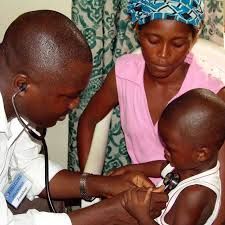Rotary Supports Strengthening of Health System in Nigeria
 A recent WHO publication estimated that Nigeria was responsible for the second highest proportion of global maternal deaths (14%), after India (17%), in 2013. This is heightening the concerns that Nigeria may fall short of attaining its MDG 5-target by 2015. One obvious reason for the persistence of high maternal mortality in Nigeria is the lack in the adoption and institutionalization of some globally acclaimed strategies for maternal death prevention. One such strategy is the Maternal Death Surveillance and Response (MDSR). The MDSR is an institutionalized tracking of maternal mortality by a multidisciplinary facility committee with a view to discerning all responsible social and medical factors and proffering solutions for preventing recurrences that are themselves tracked. A recent WHO publication estimated that Nigeria was responsible for the second highest proportion of global maternal deaths (14%), after India (17%), in 2013. This is heightening the concerns that Nigeria may fall short of attaining its MDG 5-target by 2015. One obvious reason for the persistence of high maternal mortality in Nigeria is the lack in the adoption and institutionalization of some globally acclaimed strategies for maternal death prevention. One such strategy is the Maternal Death Surveillance and Response (MDSR). The MDSR is an institutionalized tracking of maternal mortality by a multidisciplinary facility committee with a view to discerning all responsible social and medical factors and proffering solutions for preventing recurrences that are themselves tracked.
Incidentally, RFPDhad foreseen this need much earlier, as back as 2008, and worked with the governments of four states to establish a system of Quality Assurance in Obstetric (OQA)which is a programmatic involvement of key health facility personnel to track maternal and perinatal mortality within the facility, determine causative factors (especially structural & functional) and addressing them, especially through capacity building and structural improvements. This effort has gone ahead to reduce maternal and perinatal mortality in the hospitals involved.
The persistent and unacceptably high maternal mortality in Nigeria urgently needs a harmonization of both of these strategic efforts (MDSR and OQA) and their rapid scale up to all the 36 states, for the desired impact. Fortunately, it is tasks of this sort that Rotary International and RFPD are best suited to handle; the deployment of professionals to address special problems and advocating to governments to institutionalize remedies, as they have successfully done with the control of Polio infection.
Since the beginning of the pilot project and the first scaling up, RFPD has established good contacts to the participating Ministries of Health (MoHs) in the states of Kano, Kaduna, FCT Abuja and Ondo as well as to the Federal Ministry of Health in Abuja (FMoH), signed partnership statements and Memoranda of Understanding (MoU) to involve the state governments into the project implementation. A 2nd scaling up project is currently being implemented in Enugu State and a 3rd scaling up project is planned in the states of Oyo, Ogun and Lagos. When the 1st scaling up project comes to an end with the last Review Meeting on May 1-2, representatives of the four state governments will officially be handed over the responsibility to continue with the quality assurance in obstetrics. All MoHs committed themselves to integrate this successful program into their health systems. All parties involved agree that the strengthening of health systems is most important - the integration of the Rotary MCH model will be a huge step forward.
WHO. Trends in maternal mortality: 1990-2013. Estimates by WHO, UNICEF, UNFPA, The World Bank and the United Nations Population Division. 2014
Hadiza Galadanci, Wolfgang Kunzel, Oladapo Shittu, Robert Zinser, Manfred Gruhl. Stephanie Adams. Obstetric Quality Assurance to Reduce Maternal and Fetal Mortality in Kano and Kaduna State Hospitals in Nigeria. International Journal of Gynaecology and Obstetrics. 114 (2011): 23-28. |